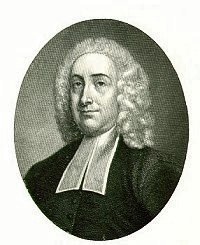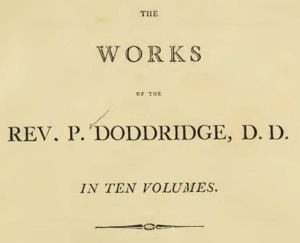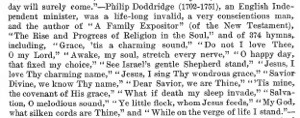 In my continuing quest for new sources of old hymns I was thrilled to discover a set of THE WORKS OF THE REV. P. DODDRIDGE, D. D. Phillip Doddridge has long been one of my favorite hymn writers by virtue of his having penned one of my favorite hymns, DO NOT I LOVE THEE, O MY LORD. Doddridge was a pastor, theologian and teacher in England from 1722 until his death on October 26, 1751. Doddridge was a member of an independent (not a member of the Church of England) nonconformist church and served as pastor for 22 years at the congregation in Northampton.
In my continuing quest for new sources of old hymns I was thrilled to discover a set of THE WORKS OF THE REV. P. DODDRIDGE, D. D. Phillip Doddridge has long been one of my favorite hymn writers by virtue of his having penned one of my favorite hymns, DO NOT I LOVE THEE, O MY LORD. Doddridge was a pastor, theologian and teacher in England from 1722 until his death on October 26, 1751. Doddridge was a member of an independent (not a member of the Church of England) nonconformist church and served as pastor for 22 years at the congregation in Northampton.
In his short life, Doddridge was blest to be contemporary of some truly great men whose names still live in our collective memories. He was a close friend of George Whitefield and the Wesley’s, and was an acquaintance of both Dr. Isaac Watts, Dr. John Gill. Augustus Toplady was greatly influenced by Doddridge’s poetry and writings. When informed of Doddridge’s death in 1751, George Whitefield (1714-1770) is reported to have exclaimed, “Doddridge is gone, Lord Jesus, prepare me to follow after.”
 In addition to more than 374 hymns written during his lifetime, Mr. Doddridge also left a rich legacy of writing in a few volumes which have come down to us today. In the attached clipping from Hassell’s History of the Church of God, Doddridge is credited with the authorship of “A Family Expositor” and “The Rise and Progress of Religion in the Soul.”
In addition to more than 374 hymns written during his lifetime, Mr. Doddridge also left a rich legacy of writing in a few volumes which have come down to us today. In the attached clipping from Hassell’s History of the Church of God, Doddridge is credited with the authorship of “A Family Expositor” and “The Rise and Progress of Religion in the Soul.”
Mr. Doddridge’s simple manner of writing is very effective in communicating his desired points with clarity and precision. In reading his writing, I don’t often find myself wondering “what is he trying to say.” His FAMILY EXPOSITOR is written in a parallel form with the KJV and his own paraphrase in the body of the book and extensive footnotes throughout.

Hymns of Doddridge which have truly fed my soul have been the substance of my Facebook postings for the past few weeks. His hymns are arranged by scriptural references as they were composed to attend specific sermons preached from his pulpit, and also include miscellaneous hymns composed for national fast days and times of great political upheaval.
“Gal. 2. 20.
My Jesus, while in mortal flesh,
I hold my frail abode,
Still would my spirit rest on thee,
Its Saviour, and its God.By hourly faith in thee I live
‘Midst all my griefs and snares;
And death, encounter’d in thy sight,
No form of horror wears.Yes, thou hast lov’d this sinful worm,
Hast given thyself for me;
Hast bought me from eternal death,
Nail’d to the bloody tree.On thy dear cross I fix mine eyes,
Then raise them to thy seat;
Till love dissolves my inmost soul,
At its Redeemer’s feet.Be dead, my heart, to worldly charms;
Be dead to every sin;
And tell the boldest foes without,
That Jesus reigns within.My life with his connected stands,
Nor asks a surer ground;
He keeps me in his gracious arms,
Where heaven itself is found.”
An additional work which I believe to be especially valuable is his, “Sermons on the Education of Young People” comprised of four messages entitled: “On the Way in which they should be trained up;” “Arguments to enforce the Duty;” “Advice to Parents;” and “An Address to different Relations, &c.”
Introducing the publication of these addresses, Doddridge wrote the following which I think speaks volumes regarding his character and pastoral care for his congregation:
“That tender concern for you and yours, which led me to treat of education, engaged me also to manage it in such a manner, as I apprehended might be most for your advantage and for theirs; that is, to make it, as far as I could, a warm and serious address to you. I have likewise, for the same reason retained that form in transcribing them for the press; though I am sensible it might have appeared more fashionable and polite, to have cast them into a different mould, and to have proposed my remarks in a more cool and general way.’
‘It is indeed my deliberate judgment, that there is an important difference between popular discourses and philosophical essays. The more I converse with the most celebrated speakers of antiquity, them ore I am confirmed in that thought; and I will take the liberty to add, that, for the sake of common christians, I could wish it were more generally considered. Bud whether in this respect I am in the right or the wrong, I must say with the apostle to the Corinthians, ‘Brethren, it is for your sakes.’
‘I would not willingly disgust persons of elevated genius and refined education; but I must confess, the great labour of my life is to bring down my discourses to common apprehensions, and to impress the consciences of men by them in subserviency to the momentous design of their eternal salvation. And as I am your shepherd, and you in a peculiar manner the people of my care, whom God has committed to my hand, and of whom he will require an account from me, I would always cherish a peculiar concern for you; and desire that, whenever I appear amongst you, my heart may overflow with a kind of parental tenderness for you. There are, perhaps, some traces of this in these discourses, which a severe critic may censure, and a profane wit may deride; nevertheless I have a cheerful hope, that they will be accepted by God, and approved by you. If divine grace render them useful to others, I would own it as an additional favour; and that they might be so, I have diligently avoided whatever might offend any serious reader; yet they are yours by a peculiar claim. For you I composed them; for you I published them; and to you I now present them; humbly commending them and you to the blessing of God, and entreating your continued prayers, that it may attend all the labours of’
Your very affectionate Brother,
and obliged Servant,
in our common Lord,
P. DODDRIDGE”
Doddridge’s closing hymn provided as a prayer of “Thanksgiving for National Deliverance, and Improvement of it” seems especially appropriate for our use in the United States today.
“Salvation doth to God belong;
His power and grace shall be our song;
His hand hath dealt a secret blow,
And terror strikes the haughty foe.Praise to the Lord, who bows his ear
Propitious to his people’s prayer;
And, though deliverance long delay,
Answers in his well chosen day.“O! may thy grace our land engage,
Rescued from fierce tyrannic rage,
The tributes of its love to bring
To thee, our Saviour, and our King!”Our temples guarded from the flame,
Shall echo thy triumphant name;
And every peaceful private home
To thee a temple shall become.Still be it our supreme delight
To walk as in thy honour’d sight:
Still in thy precepts and thy fear,
To life’s last hour to persevere.”
